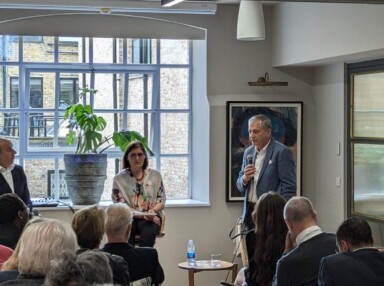Universal Basic Income Grant: When nothing is affordable, we had better choose the best unaffordable solution

The economic numbers are terrible. The effects of the lockdown are likely to see tax revenue collapse by R250-billion and the deficit rise to between 16% and 19% of GDP.
Even before Covid-19, government finances were in a mess. With an economy struggling to reach above 1% the deficit was already in scary territory. In February this year, the National Treasury was saying that only “continued spending restraint, faster economic growth, and measures to contain financial demands from distressed state-owned companies” could halt further deterioration. All of that is impossible now. The coronavirus pandemic comes after more than a decade of systematic economic mismanagement and the weakening, even crippling, of government and state-owned enterprises. We have no choice but to spend money we do not have through administrations we do not trust.
In this context nothing is affordable. It is why, among the list of unaffordable priorities, we had better choose the right ones, both for their impact and because they are doable.
President Cyril Ramaphosa announced a historic emergency package to deal with the coronavirus crisis in South Africa. It is historic because it is the largest such spending package yet. Child support grant beneficiaries will receive an extra R300 in May and from June to October they will receive an additional R500 each month. Furthermore, unemployed South Africans not already receiving a grant or not receiving a UIF payment will be eligible for R350 per month. Taken together the measures announced represent a temporary expansion of South Africa’s welfare system, both in terms of the amounts that beneficiaries will receive and by virtue of its extension to a new category of persons, the unemployed.
The announcement also revealed the government’s intention to use the current crisis to push through long-term structural reforms. “We are resolved not merely to return our economy to where it was before the coronavirus, but to forge a new economy in a new global reality.” President Ramaphosa spoke of the possibility of forging a new social compact. This is a welcome distancing from the current political culture that insists on the fundamental antagonisms between classes, races and genders. Ramaphosa spoke like a modern Social Democrat.
In the 1990s and early 2000s, what excited policymakers and academics around the world was the emergence in the Global South of new kinds of welfare regimes. This was often described as the “development revolution from the Global South”, pointing to a new way of thinking rooted in the conviction that it is better to give money directly to the poor so that they can find effective ways to escape from poverty for themselves.
Compared to the conditional cash transfer programmes that were introduced in a number of Latin American countries, cash transfer programmes in South Africa were largely unconditional. The Taylor Commission, for example, established in 2000 to explore what a comprehensive social security system would look like, mooted the introduction of a Universal Basic Income Grant. It is no surprise, therefore, that when the celebrated anthropologist James Ferguson wrote his famous study of welfare, “Give a Man a Fish”, he looked to South Africa as the pioneer of a new politics of distribution. South Africa was widely seen as a pioneer in this new movement.
The Universal Basic Income Grant (UBIG) had much support in South Africa in the form of Cosatu, large parts of civil society, ANC-aligned intellectuals and the Democratic Alliance. In 2002, some of the foremost scholars of welfare and social protection in South Africa recorded that there was huge momentum in its favour and that the country was on the cusp of “radical welfare reform”.
And then things stalled.
Joel Netshitenzhe reflected the thinking of the Thabo Mbeki administration when he rejected “hand-outs” to the poor in favour of the “dignity of work”. Opposition to UBIG was premised on an idea of South Africa, its economy and its society quite frankly out of touch with the ANC’s own analysis of South Africa as a “colony of a special type”.
Historically, welfare has operated as a back-up system to the labour market, providing temporary relief to people when they become unemployed and until they find a new job. In South Africa, however, unemployment for the vast majority of people is not a temporary condition.
Why? As black South Africans won political rights they correctly pushed for higher wages and the dismantling of the institutions that kept labour cheap. Companies that traditionally employed substantial numbers of workers (like mines and farms) have, where possible, replaced labour for machines. Or they have gone out of business. Moreover, apartheid suppressed an internal market for South African-made goods. South African consumers have often favoured imported products. In the early days of the transition, “developmental welfarism” partly recognised this situation by looking to government to create employment through large-scale public works programmes.
Welfare provisions are based on a gendered division of labour that assumes a male breadwinner goes out every day to support his family. This is why social grants go overwhelmingly to women as caregivers.
There is no doubt that the current system is associated with major achievements. There has been, for example, a decrease in child poverty and child hunger, and an increase in school enrolments. It has also given young women independence and autonomy that they otherwise would not have.
At the same time, it has left African and coloured men, in particular, in an impossible situation – unemployed and unable to access social assistance. In a conservative and religious society that expects traditional roles from men and women, and that rewards men greatly for performing in such a way, the consequences have been disastrous. Unable to provide for their families or dependents, they struggle to recognise or be recognised as “proper” men. High levels of violence against women and children in South Africa might be a consequence of this structural violence, rather than simply a result of men’s “toxic masculinity”.
The failure adequately to factor the colonial character of South Africa’s economy, society and state into the design of the current welfare system has also left it with complex administrative challenges. The government must provide multiple, differentiated grants to different sections of the population. Yet post-apartheid South Africa has a troubled administrative history, caused in part by the legacy of apartheid (Bantustans and multiple racialised administrations) and compounded by the inappropriate politicisation of government administrations from early on in the transition.
The agency that administers grants (SASSA) on behalf of the Department of Social Development was created in 2005. It has never had the capacity to perform this function itself, outsourcing its role to others, including the notorious Cash Paymaster Services and more recently to the Post Office. There is growing scepticism, if not alarm, about the ability of government to administer various rescue packages. If the department of social development cannot administer the child support grant, how will it deliver R350 a month to people who are not currently on any system? “It just isn’t going to happen,” is the short answer from Peter Bruce, writing in Business Day.
This is why the move to UBIG is urgent in the current situation. It would provide basic economic security to each individual, regardless of marital, family or household status. It should be paid with no means testing, at regular intervals, and without direction or restrictions on how to spend it. The South African and international experience suggests that male recipients of a UBIG are no more likely to drink it away than young women are likely to fall pregnant to get a child support grant.
It is also much easier to administer than a selective grant. Without means testing or other conditionalities it only requires a system that makes sure someone doesn’t receive it more than once a month. This can be done with an ID or some other biometric scan. In the current emergency, it can be administered by banks or large retailers.
It might well be that the additional costs of UBIG will be offset in the medium and long-term by lower levels of domestic and social violence, and the attendant economic opportunities that such a situation would create. It also makes the UBIG an exemplary candidate to be financed through loans that future generations might be very grateful to pay off.
If South Africa’s current and future integrity lies in a new model of social solidarity, then a universal basic income grant may well be its condition of possibility. It would then be the best unaffordable investment South Africa could make.
This article was published in the Daily Maverick here



